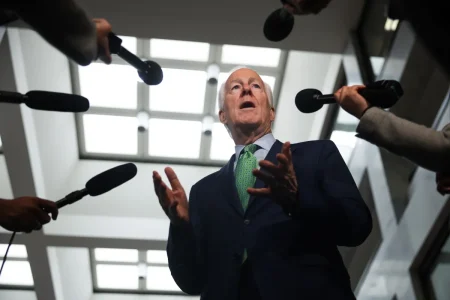Texas Senate Race Heats Up as Cornyn Leads Paxton in New Poll
A fresh political battleground is emerging in the Lone Star State as incumbent Senator John Cornyn and Texas Attorney General Ken Paxton position themselves for what promises to be a contentious Republican primary in 2026. According to a recent poll by Texas Public Opinion Research, Cornyn currently holds a modest lead over Paxton, with 32 percent of potential voters favoring the incumbent compared to Paxton’s 26 percent. This six-point difference falls just outside the poll’s 4.6 percent margin of error, suggesting a genuine, if narrow, advantage for Cornyn at this early stage. Perhaps most tellingly, nearly a third of voters (29 percent) remain undecided, while 9 percent indicated they would not participate in the race at all. These numbers reveal a Republican electorate that has yet to fully commit to either candidate, leaving ample room for momentum shifts as the March 2026 primary approaches.
The stakes of this Republican showdown extend far beyond internal party politics. Texas has long been considered a Republican stronghold, with Democrats unable to secure a Senate victory since 1988. However, changing demographics and increasing political polarization have gradually transformed parts of Texas into more competitive territory. The same poll indicates that while 48 percent of respondents would back the Republican nominee in the general election, 43 percent would support the Democratic candidate—a narrower margin than typical for Texas Senate races. This suggests potential vulnerability for Republicans if their primary produces a weakened or divisive nominee. With Republicans currently holding only a thin majority in the U.S. Senate, Democrats are actively searching for opportunities to flip seats in traditionally red states, and a fractious Republican primary in Texas could provide exactly such an opening.
Both Republican contenders enter this race with considerable political baggage. Senator Cornyn, despite his lengthy tenure and established position within the Republican establishment, registers underwhelming approval ratings, with only 27 percent of those polled viewing him favorably compared to 31 percent who regard him unfavorably. Paxton’s numbers are similarly problematic, with a 25 percent favorable rating against a 34 percent unfavorable score. These figures reflect broader challenges facing both candidates: Cornyn has been criticized by the party’s Trump-aligned base for occasionally breaking with the former president, while Paxton, though closely aligned with Trump, has weathered significant legal controversies, including an impeachment by the Republican-controlled Texas House (though he was ultimately acquitted by the state Senate). The contrasting styles and positions of these candidates represent the ongoing tension within the Republican Party between traditional conservatism and the more confrontational approach championed by Trump loyalists.
On the Democratic side, the poll reveals its own interesting dynamics, with former presidential and Senate candidate Beto O’Rourke narrowly leading at 27 percent, followed closely by Representative Jasmine Crockett at 26 percent and Colin Allred trailing at 13 percent. O’Rourke’s previous Senate bid against Ted Cruz in 2018 demonstrated unexpected Democratic strength in Texas, falling just 2.6 percentage points short of victory. This historical near-miss, combined with the current polling showing a relatively close hypothetical general election, suggests Democrats could mount a serious challenge if the right conditions materialize. The competitiveness of the Democratic primary indicates the party sees genuine opportunity in Texas, motivated in part by demographic shifts in urban and suburban areas that have gradually made the state more politically diverse.
Political analysts see the high number of undecided voters as the most significant aspect of the current polling landscape. As D. Stephen Voss, a political science professor at the University of Kentucky, noted, “The real story in this poll is not about who is leading. Rather, having so many voters undecided tells us that the Republican nomination battle in Texas remains fluid.” This fluidity means both Cornyn and Paxton have substantial room to shape voters’ perceptions before the primary. Paxton has aggressively positioned himself as the Trump-aligned alternative, stating on social media that “For years, John Cornyn has betrayed President Trump and the America First movement. Texas deserves better.” Meanwhile, Cornyn emphasizes his “lifelong conservative” credentials and portrays himself as a pragmatic fighter against “Washington overreach” who delivers “real results” for Texans. As the campaign progresses, these competing narratives will battle for supremacy among Republican primary voters.
The broader implications of this race extend to the national political landscape. With Republicans holding a narrow Senate majority and facing a challenging map in 2026, maintaining traditionally safe seats like the one in Texas is crucial to their long-term control of the chamber. Democrats, meanwhile, see potential opportunity in a state that has shown glimmers of competitiveness in recent cycles. If Paxton defeats Cornyn in the primary, Democrats may sense vulnerability given Paxton’s higher unfavorability ratings and controversial background. Conversely, if Cornyn prevails but emerges wounded from a bitter primary, Democrats could still see an opening. Ultimately, the Texas Senate race represents not just a battle between two prominent Republicans with different visions for their party, but also a test case for whether Texas might eventually join the ranks of genuine battleground states. As the March 2026 primary approaches, both parties will be watching closely to see which direction Texas voters lean in this high-stakes political showdown.















